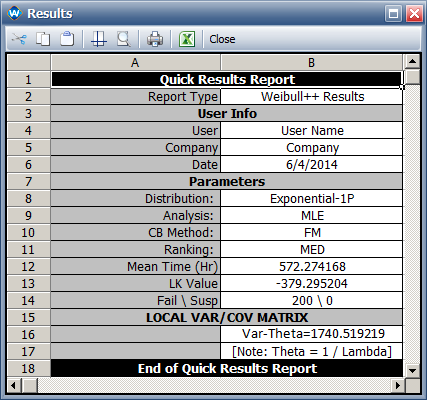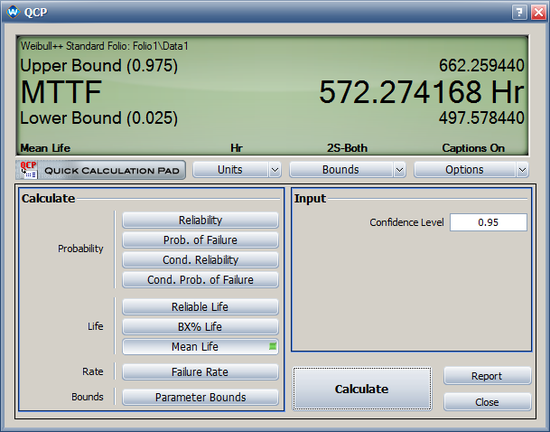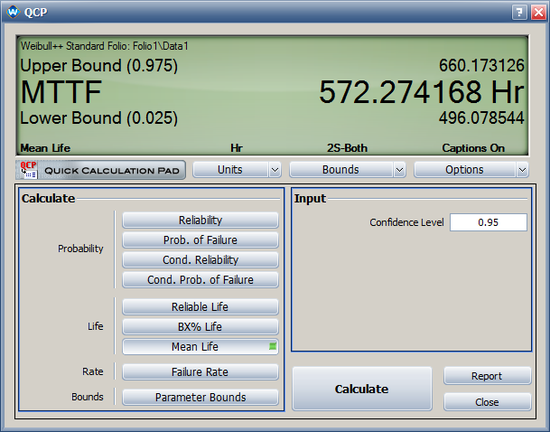1P-Exponential MLE Solution for Interval Data: Difference between revisions
Jump to navigation
Jump to search
Kate Racaza (talk | contribs) No edit summary |
Kate Racaza (talk | contribs) No edit summary |
||
| (3 intermediate revisions by the same user not shown) | |||
| Line 1: | Line 1: | ||
{{Reference Example}} | {{Reference Example}} | ||
This example validates the calculations for the MLE solution, likelihood ratio bound and Fisher Matrix bound for a 1-parameter exponential distribution with interval data in Weibull++ standard folios. | |||
{{Reference_Example_Heading1}} | {{Reference_Example_Heading1}} | ||
| Line 33: | Line 33: | ||
{{Reference_Example_Heading3}} | {{Reference_Example_Heading3}} | ||
The cumulative distribution function for an exponential distribution is: | The cumulative distribution function for an exponential distribution is: | ||
| Line 38: | Line 39: | ||
The ML estimate <math>\hat{\theta}\,\!</math> = 572.3, and the standard deviation is <math>se_{\hat\theta}\,\!</math> = 41.72. Therefore the variance is 1740.56. | The ML estimate <math>\hat{\theta}\,\!</math> = 572.3, and the standard deviation is <math>se_{\hat\theta}\,\!</math> = 41.72. Therefore the variance is 1740.56. | ||
The 95% 2-sided confidence interval for <math>{\theta}\,\!</math> are: | |||
* Based on the likelihood ratio, the confidence interval is [498, 662]. The calculation is based on | * Based on the likelihood ratio, the confidence interval is [498, 662]. The calculation is based on | ||
::<math>-2ln\left [ \frac{L(\theta)}{L(\hat{\theta})} \right ] = X^{2}_{(0.90,1)}\,\!</math> | ::<math>-2ln\left [ \frac{L(\theta)}{L(\hat{\theta})} \right ] = X^{2}_{(0.90,1)}\,\!</math> | ||
| Line 53: | Line 55: | ||
::<math>\begin{alignat}{2} | ::<math>\begin{alignat}{2} | ||
[\theta_{L},\theta_{U}]&= \hat{\theta}exp(\pm 1.96\times \frac{se_{\hat{\theta}}}{\hat{\theta}})\\ | [\theta_{L},\theta_{U}]&= \hat{\theta}exp\left(\pm 1.96\times \frac{se_{\hat{\theta}}}{\hat{\theta}}\right)\\ | ||
&=\left [572.3\times exp \left(-1.96\times\ | &= \left[572.3\times exp \left(-1.96\times\frac{41.72}{572.3}\right),572.3\times exp \left(1.96\times\frac{41.72}{572.3}\right)\right]\\ | ||
&= [496,660]\\ | &= [496,660]\\ | ||
\end{alignat}</math> | \end{alignat}</math> | ||
| Line 73: | Line 75: | ||
* Based on the likelihood ratio (Select LRB for the confidence bound), the confidence interval is: | * Based on the likelihood ratio (Select LRB for the confidence bound), the confidence interval is: | ||
[[Image: | [[Image:1PE_interval_data_qcp.png|center|550 px]] | ||
* Based on lognormal approximation (select FM for the bound method), the confidence bounds are: | * Based on lognormal approximation (select FM for the bound method), the confidence bounds are: | ||
[[Image:1PE_interval_data_qcp_FM.png|center|550 px]] | |||
[ | |||
Latest revision as of 16:16, 28 September 2015
New format available! This reference is now available in a new format that offers faster page load, improved display for calculations and images and more targeted search.
As of January 2024, this Reliawiki page will not continue to be updated. Please update all links and bookmarks to the latest references at Weibull examples and Weibull reference examples.



